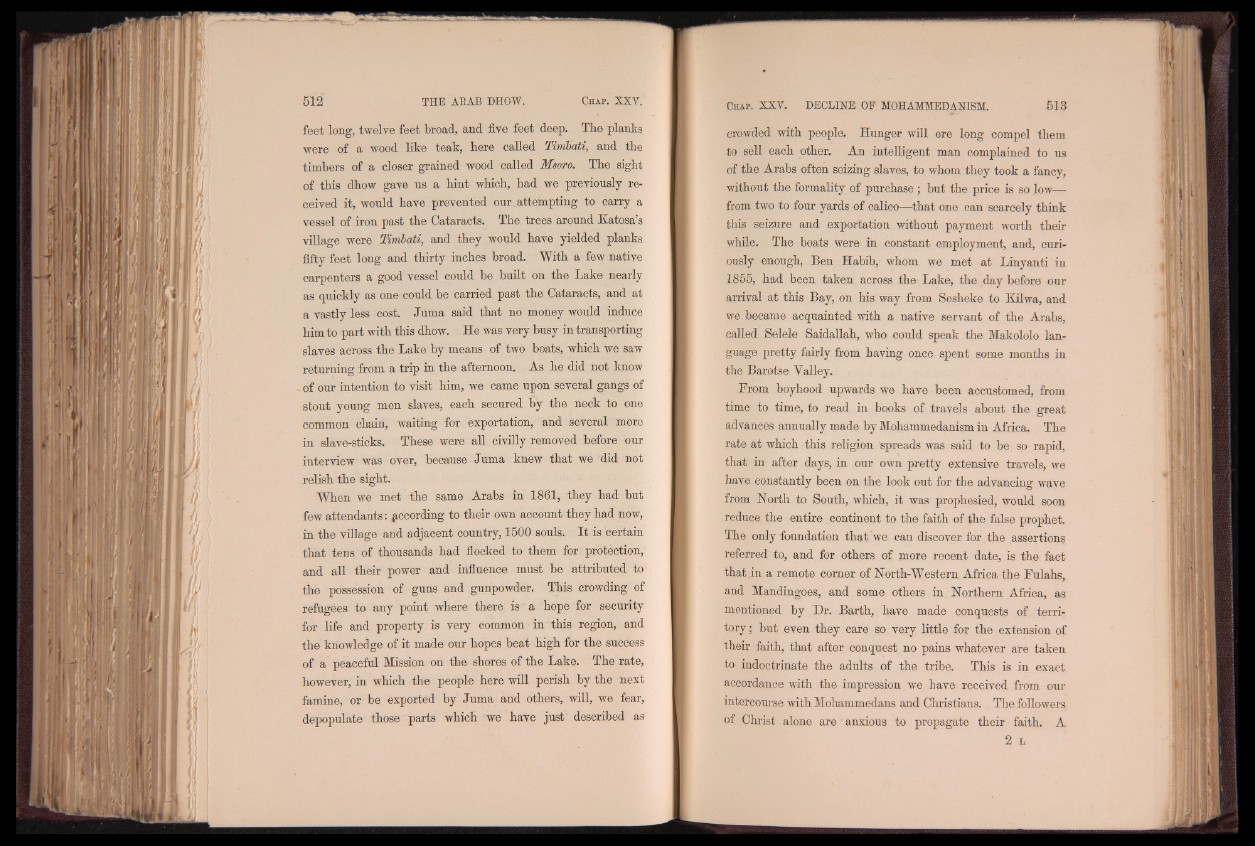
feet long, twelve feet broad, and five feet deep. The planks
were of a wood like teak, here called Timbati, and the
timbers of a closer grained wood called Msoro. The sight
of this dhow gave ns a hint which, had we previously received
it, would have prevented our.attempting to carry a
vessel of iron past the Cataracts. The trees around Katosa’s
village were Timbati, and they would have yielded planks,
fifty feet long and thirty inches broad. With a few native
carpenters a good vessel could be built on the Lake nearly
as quickly as one could be carried past the Cataracts, and at
a vastly less cost. Juma said that no money would induce
him to part with this dhow. He was very busy in transporting
slaves across the Lake by means of two boats, which we saw
returning from a trip in the afternoon. As he did not know
of our intention to visit him, we came upon several gangs of
stout young men slaves, each secured by the neck to one
common chain, waiting for exportation, and several more
in slave-sticks. These were all civilly removed before our
interview was over, because Juma knew that we did not
relish the sight.
When we met the same Arabs in 1861, they had but
few attendants: Recording to their own account they had now,
in the village and adjacent country, 1500 souls. I t is certain
that tens of thousands had flocked to them for protection,:
and all their power and influence must be attributed to
the possession of guns and gunpowder. This crowding of
refugees to any point where there is a hope for security
for life and property is very common in this region, and
the knowledge of it made our hopes beat high for the success
of a peaceful Mission on the shores of the Lake. The rate,
however, in which the people here will perish by the next
famine, or be exported by Juma and others, will, we fear,
depopulate those parts which we have just' described as
crowded with people. Hunger will ere long compel them
to sell each other. An intelligent man complained to us
of the Arabs often seizing slaves, to whom they took a fancy,
without the formality of purchase ; but the price is so low—
from two to four yards of calico—that one can scarcely think
this seizure and exportation without payment worth their
while. The boats were in constant employment, and, curiously
enough, Ben Habib, whom we met at Linyanti in
1855, had been taken across the Lake, the day before our
arrival at this Bay, on his way from Sesheke to Kilwa, and
we became acquainted with a native servant of the Arabs,
called Selele Saidallah, who could speak the Makololo language
pretty fairly from having once spent some months in
the Barotse Valley.
From boyhood upwards we have been accustomed, from
time to time, to read in books of travels about the great
advances annually made by Mohammedanism in Africa. The
rate at which this religion spreads was said to be so rapid,
that in after days, in our own pretty extensive travels, we
have constantly been on the look out for the advancing wave
from North to South, winch, it was prophesied, would soon
reduce the entire continent to the faith of the false prophet.
The only foundation that we can discover for the assertions
referred to, and for others of more recent date, is the fact
that,in a remote comer of North-Western Africa the Fulahs,
and Mandingoes, and some others in Northern Africa, as
mentioned by Dr. Barth, have made conquests of territory
; but even they care so very little for the extension of
their faith, that after conquest no pains whatever are taken
to indoctrinate the adults of the tribe. This is in exact
accordance with the impression we have received from our
intercourse with Mohammedans and Christians. The followers
of Christ alone are anxious to propagate their faith. A
2 L